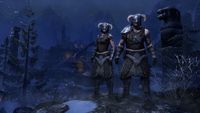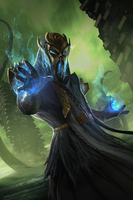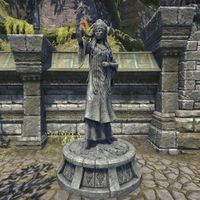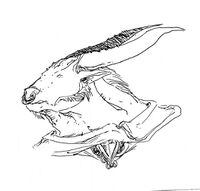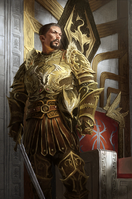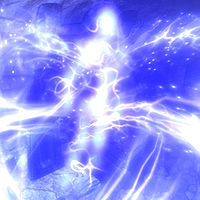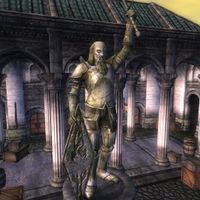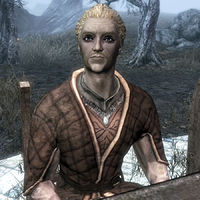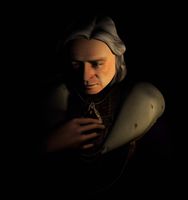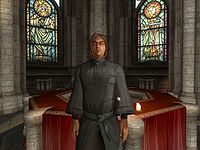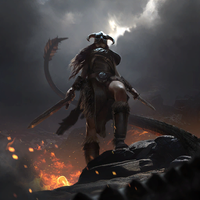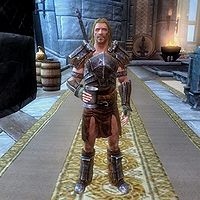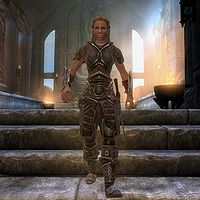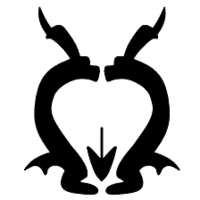Lore:Dragonborn
This article is about mortals blessed by Akatosh. For the player character of Skyrim, see Last Dragonborn.

A Dragonborn (or Dovahkiin in Dragon Language) is a mortal blessed with the Blood and soul of a dragon by Akatosh, the Father of Dragons and chief of the Divines.[1] Some sources claim that Dragonborn are fragments of Akatosh's soul and share this status with Alduin and possibly all of Dragonkind.[2] Those with the blessing have an extraordinary aptitude in the use of the thu'um, being able to absorb knowledge of shouts directly from the souls of slain dragons.[3] This ability breeds fear and hatred in dragons, as the removal of their soul severs their immortality and renders them beyond the reach of any necromancy.[1] The first known Dragonborn was Miraak, a dragon priest of the Merethic Era who used the thu'um in an unsuccessful revolt against his masters.[4] However, the title itself is most often associated with the "Dragonborn Emperors" of Tamriel, who were in a divine covenant with Akatosh which maintains the barriers between Mundus and Oblivion.[5]
Dragonborn Emperors[edit]
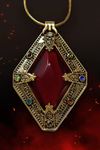
- "So long as the Blood of the Dragon runs strong in her rulers, the glory of the Empire shall extend in unbroken years." —from the liturgy of the Re-Kindling of the Dragonfires[5]
Any subject of the Empire prior to the Fourth Era would say they were ruled by the "Dragonborn Emperors", but very few understood what that title meant.[6] Its usage stretches back to Saint Alessia, who founded the Cyrodilic Empire in a First Era covenant with Akatosh. The Dragon God imbued Alessia's line with blood from his own heart, initiating a sacred compact which kept the Dragonfires lit and Oblivion's influence barred from Mundus, so long as those of the Dragon Blood wore the Amulet of Kings.[5] Ever since, the legitimate rulers of the Empire have been Dragonborn: Alessia's successors, Reman Cyrodiil and his heirs, and finally the Septim Dynasty. Indeed, the title is particularly associated with Tiber Septim himself, perhaps because he made notable use of the thu'um in his early conquests.[7][8] Only these true rulers, approved by Akatosh, could wear the Amulet of Kings and light the Dragonfires.[6] In addition, they enjoyed the protection and service of the Blades, descended from the Akaviri Dragonguard, who follow the Dragonborn as "the ultimate dragonslayer",[9] as the "mortal representative of the Dragon Blood of the divine Talos."[10] The line of Dragonborn rulers was abruptly severed through assassination at the end of the Third Era, leading to the Oblivion Crisis as the Dragonfires went out. Eventually, the last of the Septim bloodline sacrificed himself and the Amulet to permanently restore the liminal barrier.[11] The Mede Dynasty that subsequently seized control of the Empire lacks the Dragonborn trait.
Dragonborn Heroes[edit]
- Dragonborn, Dragonborn, by his honor is sworn,
- To keep evil forever at bay!
- And the fiercest foes rout when they hear triumph's shout,
- Dragonborn, for your blessing we pray! —Songs of Skyrim
The Dragonborn plays a prominent role in the legends of the Nords of Skyrim, who tell tales of heroes who would "kill dragons and steal their power".[12][13] It is not known how many Dragonborn have arisen over the course of history. The Greybeards of High Hrothgar warned that many of them met their downfall because the ease with which they learned the thu'um made them arrogant. The Greybeards attempt to inculcate the values of the Way of the Voice, and strongly disapprove of the violent use of thu'um in general, but tolerate it among those who have been blessed by the gods.[14]
With the return of the dragons in 4E 201 came the emergence of the first Dragonborn hero since Tiber Septim to be summoned by the Greybeards for training. In the fulfillment of an ancient Akaviri prophecy, known as the Prophecy of the Dragonborn, this Last Dragonborn learned to master the thu'um and defeated Alduin.[15]
Gallery[edit]
Notes[edit]
- Most Third Era scholars believed the term was first used in reference to Saint Alessia.[6] However, Miraak, taking the title of "First Dragonborn", made himself known in the Fourth Era, disproving this.[16]
- In response to confusion in the Bethesda Softworks Forums about the announcement of the first Dragonborn in the Dragonborn official add-on who wasn't St. Alessia, Michael Kirkbride said: "Alessia didn't have the power to absorb dragon souls. Hers was a much more nuanced power: to dream of liberty and give it a name and on her deathbed make Covenant with the Aka-Tusk."[UOL 1]
- In Game Informer, Issue 214:57, Todd Howard said: "The dragonborn can battle the dragons on another level. They're annointed by the gods. That's why they can light the dragonfires to become emperor. They kind of help make the world whole."
- Some Dragonborn are known to possess the gift of Sight. It was said that the dragon blood possessed by members of the Septim Dynasty allowed them to see more than lesser men.[17] Emperor Uriel Septim VII was troubled all his life by dreams that showed him visions of the future, including his assassination and the start of the Oblivion Crisis that followed.[18]
- According to some, the ancient Nord hero and king Ysmir Wulfharth was a Dragonborn.[19][20]
- Following a transformative process, Mankar Camoran claimed he could speak with another tongue and "speak fire". He was also capable of wearing the Amulet of Kings, which could only be worn by those said to have the 'Dragon Blood' in their veins.[21][22][10]
- The Nerevarine was referred to as "Dragon-born" in The Lost Prophecy as a symbolic way of saying they were born under the banner of the Empire.
See Also[edit]
- For game-specific information, see the Skyrim article.
Books[edit]
- The Book of the Dragonborn by Prior Emelene Madrine — A treatise on the Dragonborn
- Trials of St. Alessia — Excerpt from a greater work detailing the creation of the Amulet of Kings
References[edit]
- ^ a b Paarthurnax's dialogue in Skyrim
- ^ Vonos's Journal
- ^ Ulfric Stormcloak's dialogue in Skyrim
- ^ The Guardian and the Traitor — Lucius Gallus
- ^ a b c Trials of St. Alessia
- ^ a b c The Book of the Dragonborn — Prior Emelene Madrine
- ^ Generic Imperial Cult dialogue in Morrowind
- ^ The Arcturian Heresy — The Underking, Ysmir Kingmaker
- ^ Delphine's dialogue in Skyrim
- ^ a b Jauffre's dialogue in Oblivion
- ^ Light the Dragonfires quest in Oblivion
- ^ Whiterun Guard's dialogue in Skyrim
- ^ Dragon Warrior costume description in ESO
- ^ Arngeir's dialogue in Skyrim
- ^ Events of Skyrim
- ^ Miraak's dialogue in Skyrim: Dragonborn
- ^ Baurus' dialogue in Oblivion
- ^ Emperor Uriel Septim's dialogue in Oblivion
- ^ Dialogue with Jarl Balgruuf the Greater
- ^ Nels the Naughty's dialogue in Oblivion
- ^ Mythic Dawn Commentaries 1 — Mankar Camoran
- ^ Dagon Shrine quest in Oblivion
Note: The following references are considered to be unofficial sources. They are included to round off this article and may not be authoritative or conclusive.
